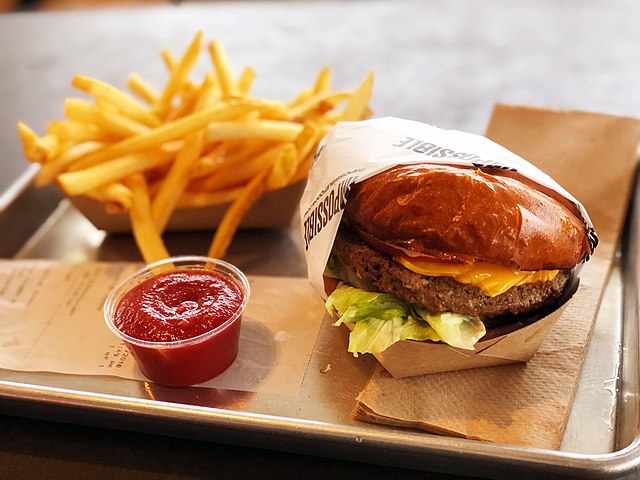
In terms of being forward-thinking, plant-based food companies seem to be fitting right in. Their ability to anticipate obstacles runs deeper than tackling climate change through food. Plant-based food producers have also hit the ground running in terms of figuring out what areas of the law they can rely on for protection.
One major producer of vegan meat-substitutes, Impossible Foods, offers a prime example of where some plant-based producers have turned to for legal protection. Impossible Foods mission is “to make the global food system truly sustainable by eliminating the need to make food from animals.”[1] One of the biggest obstacles that plant-based meat producers face is finding a way to make plants have the savory meat flavor that people crave. Companies like Impossible Foods have needed to dedicate massive amounts of resources to develop products that uphold its mission while also satisfying its consumer base. Impossible Foods CEO and Founder, Patrick Brown, emphasized the importance of the research and development process: “Our scientists spend so much time and effort studying a single molecule – heme – because heme is what makes meat taste like meat. It turns out that finding a sustainable way to make massive amounts of heme from plants is a critical step in solving the world’s greatest environmental threat.”[2] Naturally, companies dedicating incredible amounts of time, money, and other resources want to protect their processes for creating these products, particularly as they’re becoming more and more popular. Therefore, companies like Impossible Foods are turning to patent law. Impossible Foods has 17 patents that protect its methods for creating various plant-based meat products and numerous trademarks to protect the brand itself.[3] These, and more, forms of intellectual property protection are tools that the companies can use to ward off competitors from stealing their recipes and logos and to keep unfair competition at bay.
While we might expect to see a heft majority of legal battles arising out of competition within this up-and-coming market, some other legal struggles are appearing outside of the plant-based community. One such problem stems from the fact that companies like Impossible Foods use words that trigger conflicting responses from the public, like “meat” and “burger.” We might think that courts would become flooded with claims of false advertisement surrounding the use of words like “meat” in connection with plant-based products, but these claims, if any come to be, will be difficult to prove. False Advertising under Section 43(a) of the Lanham Act requires a showing that the defendant made a false or misleading statement as to their products, actual deception or a tendency to deceive a substantial portion of the intended audience, that the deception is material and likely to influence purchasing decisions, that the advertised goods travel in interstate commerce, and the likelihood of injury to the plaintiff.[4] The reason these claims are less likely to prevail is because many plant-based companies are careful to ensure that their products are labeled as plant-based, vegan, or vegetarian. Without such a distinction, the brands would not be accomplishing their goal of reaching a meatless audience.
What we’ve actually seen festering are state statutes that companies like Impossible Foods are challenging under the First Amendment. 25 States have introduced legislation in an attempt to prevent plant-based companies from labeling their products with the words, “meat” or “beef.”[5] Some of these bills have not yet been passed and others are facing legal challenges, specifically on first amendment grounds.[6] One such claim arose in the case of Turtle Island Foods v. Richardson.[7] In Turtle Island Foods, a Missouri statute prohibited the “misrepresenting the cut, grade, brand or trade name, or weight or measure of any product, or misrepresenting a product as meat that is not derived from harvested production livestock or poultry.”[8] Violation of the statute constitutes a class A misdemeanor, punishable by a $1,000 fine or imprisonment for up to one year.[9] Turtle Island Foods’s products are all clearly indicated as being plant-based, meatless, vegetarian or vegan but since its labels also include terms applied to conventional meat, like “burgers” it fears prosecution under the statute.[10]
Turtle Island Foods argued that under the First Amendment, they have the right to engage in truthful commercial speech and to control the content of speech as well as to engage in protected advocacy activities.[11] They claimed that the Missouri statute “unreasonably restricts the right by prohibiting them from making truthful statements about the identity, quality, and characteristic of vegan and plant-based products, including referring to their product using meat or meat analogue terms” and that they’re prohibited from “truthfully labeling, marketing, and advertising plant-based meat products in a manner that effectively describes them as replacements for conventional meat.”[12] The court denied Turtle Island Foods a preliminary injunction, concluding that the balance of equities and the public interest weighed against granting the injunction.[13] It will be interesting to see how First Amendment claims, like those in Turtle Island Foods, play out and shape First Amendment jurisprudence.
Another source of labeling regulation comes from the Food and Drug Administration. The Federal Food, Drug, and Cosmetic Act asserts that a food is misbranded “[i]f its labeling is false or misleading in any particular, or … it’s advertising is false or misleading in a material respect or its labeling is in violation of § 350(b)(2)”.[14] In other words, a food label is misleading if “it mischaracterizes an ingredient or nutrient level that is required to be in that type of food or beverage.”[15] Scott Gottlieb, the Commissioner of the FDA, expressed a desire to restrict the use of the word “milk” by enforcing these regulations geared to prohibit misleading labels.[16] The FDA defines milk as “lacteal secretion … obtained by the complete milking of one or more healthy cows.”[17] So can companies really be selling almond and soy “milk”? The National Milk Producers Federation argued that the nutritional value of dairy milk is not comparable to non-dairy drink alternatives[18] and the Plant Based Foods Association countered that any attempts to restrict non-dairy milk labels “would harm the market for such drinks by hindering innovation and increasing costs.”[19] Further, the Plant Based Food Association made a Turtle Island Foods style argument, claiming that enforcing labeling restrictions would violate free speech rights.[20]Even though there are apparent nutritional discrepancies between the dairy and non-dairy milks, the Good Food Institute asserts that consumers are not really confused by such non-dairy products[21] and the Court of Appeals for the Ninth Circuit held in December of 2017 that labeling almond milk as “milk” was not deceptive nor clear mislabeling in violation of federal statute.[22] The FDA opened itself to commentary from the public in September of 2018, and it received over 8,000 comments.[23]
Similarly, the FDA tried to stop Hampton Creek Foods from using the term “mayo” on the company’s vegan mayonnaise product “Just Mayo”.[24] Ultimately, the parties settled and JUST developed a new label that removed emphasis from the word “mayo.” The opportunity for the FDA to work alongside plant-based food producers may seem optimal, but will language in the Food, Drug and Cosmetic Act leave the FDA with their hands tied? As Gottlieb himself said in an interview, “an almond doesn’t lactate.”[25]
Hannah Rosenson is a Second Year Law Student at the Benjamin N. Cardozo School of Law and a Staff Editor at the Cardozo Arts & Entertainment Law Journal. Hannah is also the current president of the Cardozo International Law Society.
[1] Impossible Foods, https://impossiblefoods.com/company/ [https://perma.cc/6ZWQ-SKTW] (last visited Feb. 6, 2020).
[2] Impossible Foods Closes a $75 Million Investment After Achieving Key Milestones, Business Wire (Aug. 1, 2017) https://www.businesswire.com/news/home/20170801005659/en/Impossible-Foods-Closes-75-Million-Investment-Achieving [https://perma.cc/NUS5-MWP5].
[3] Patents Assigned to Impossible Foods Inc., Justia Patents,https://patents.justia.com/assignee/impossible-foods-inc [https://perma.cc/C2ZM-E2FM] (last visited Feb. 6, 2020).
[4] 15 U.S.C.A. §1125 (2012).
[5] Elaine Watson, Plant-Based and Cell-Cultured ‘Meat’ Labeling Under Attack in 25 States, Food Navigator-USA (May 29, 2019)https://www.foodnavigator-usa.com/Article/2019/05/29/Plant-based-and-cell-cultured-meat-labeling-under-attack-in-25-states# [https://perma.cc/WGJ3-E4BS].
[6] Id.
[7] Turtle Island Foods v. Richardson, No. 2:18-CV-04173, 2019 WL 7546586 (W.D. Mo. Sept. 30, 2019).
[8] Id. at *1.
[9] Id.
[10] Id.
[11] Id. at *4.
[12] Id.
[13] Id. at *6.
[14] 21 U.S.C.A. § 343(a) (2019).
[15] Edward Hale, Got Soy Beverage?, The Regulatory Review (Mar. 20, 2019) https://www.theregreview.org/2019/03/20/hale-got-soy/ [https://perma.cc/KXH4-YAX7].
[16] Hale, supra note 15.
[17] 21 U.S.C.A. § 133.3(a) (2019).
[18] Hale, supra note 15.
[19] Hale, supra note 15.
[20] Hale, supra note 15.
[21] Hale, supra note 15.
[22] Painter v. Blue Diamond Growers, 757 F. App’x 517 (9th Cir. 2018).
[23] Hale, supra note 15.
[24] Beth Mole, Eggless Condiment Can Still Be Called Mayo, Says FDA, ARSTechnica (Dec. 18, 2005) https://arstechnica.com/science/2015/12/egg-less-condiment-can-still-be-called-mayo-fda/ [https://perma.cc/S85H-MCBN].
[25] Alexander Nieves, Gottlieb: FDA to Crack Down on Labeling Nondairy Products as ‘Milk’, Politico (July 17, 2018 11:25 AM) https://www.politico.com/story/2018/07/17/almond-lactate-nondairy-milk-scott-gottlieb-725974 [https://perma.cc/M8AM-VJSB].



